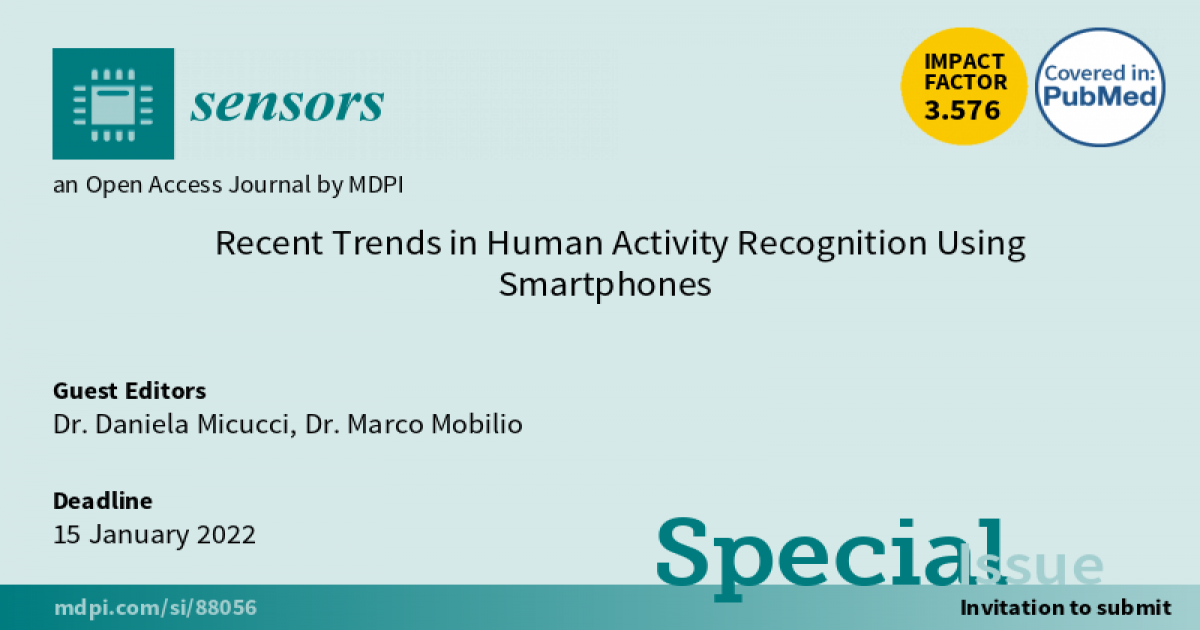Recent Trends in Human Activity Recognition Using Smartphones
A special issue of Sensors (ISSN 1424-8220). This special issue belongs to the section "Intelligent Sensors".
Deadline for manuscript submissions: closed (15 January 2022) | Viewed by 545

Special Issue Editors
Interests: software architecture; mobile-based systems; m-health; self-healing; self-repairing
Special Issues, Collections and Topics in MDPI journals
Interests: software architecture; self-healing; self-repairing; cloud computing; monitoring
Special Issues, Collections and Topics in MDPI journals
Special Issue Information
Dear Colleagues,
Human activity recognition (HAR) is a field of research that aims at defining and experimenting new techniques able to automatically recognize human activities exploiting signals recorded by sensors embedded in wearable and/or environmental devices. Environmental devices often require an installation in the home environment, cannot be used outside the home environment, and can sometimes be perceived as intrusive devices, especially by elderly people. For these reasons, in recent years, the focus has shifted to the use of wearable devices.
Several ad hoc wearable devices have been proposed, and experiments with them have been conducted. However, these devices have limitations due to their additional cost, the likely possibility of users forgetting to wear them, and the discomfort they can generate.
Smartphones are able to solve most of these issues, both because in recent years, they are widely used among the population (including the elderly), and because they are usually “worn” and kept on the person at most times.
In addition, the ever-increasing computational capabilities of smarphones enable the execution of more complex tasks directly on the device, thus simplifying the overall HAR systems. Some modern devices also have dedicated processors on board for machine learning tasks.
Thus, exploiting smartphones for data collection and activity recognition is one of the “hot” topics related to HAR. There are many open challenges in this research area, including power consumption and battery optimization, model personalization with respect to the end user, multimodal signal fusion, and many others.
The aim of this Special Issue, “Recent Trends in Human Activity Recognition using Smartphones”, is to attract high-quality, innovative, and original papers related to the field of human activity recognition that exploits, enhances, or optimizes the use of smartphones and other similar devices. Submissions may cover novel approaches and architectures, innovative algorithms, and machine-learning-based techniques, as well as experimental results and surveys of the literature.
Topics of interest include but are not limited to the following:
- Sensors data fusion;
- Smartphones’ power management and battery optimisation in HAR;
- Machine and deep learning solutions using smartphone sensors;
- Innovative HAR applications and architectures;
- Wellbeing supported by smartphones;
- M-Health;
- Smartphone-based HAR for Ambient Assisted Living.
Dr. Daniela Micucci
Dr. Marco Mobilio
Guest Editors
Manuscript Submission Information
Manuscripts should be submitted online at www.mdpi.com by registering and logging in to this website. Once you are registered, click here to go to the submission form. Manuscripts can be submitted until the deadline. All submissions that pass pre-check are peer-reviewed. Accepted papers will be published continuously in the journal (as soon as accepted) and will be listed together on the special issue website. Research articles, review articles as well as short communications are invited. For planned papers, a title and short abstract (about 100 words) can be sent to the Editorial Office for announcement on this website.
Submitted manuscripts should not have been published previously, nor be under consideration for publication elsewhere (except conference proceedings papers). All manuscripts are thoroughly refereed through a single-blind peer-review process. A guide for authors and other relevant information for submission of manuscripts is available on the Instructions for Authors page. Sensors is an international peer-reviewed open access semimonthly journal published by MDPI.
Please visit the Instructions for Authors page before submitting a manuscript. The Article Processing Charge (APC) for publication in this open access journal is 2600 CHF (Swiss Francs). Submitted papers should be well formatted and use good English. Authors may use MDPI's English editing service prior to publication or during author revisions.
Keywords
- Human activity recognition
- Machine learning
- Deep learning
- Sensors
- Smartphones
- Ambient assisted living







